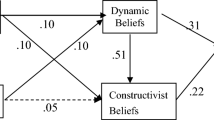Abstract
This study compared the pedagogical contentknowledge of mathematics in U.S. and Chinesemiddle schools. The results of thiscomparative study indicated that mathematicsteachers' pedagogical content knowledge in thetwo countries differs markedly, which has adeep impact on teaching practice. The Chineseteachers emphasized developing procedural andconceptual knowledge through reliance ontraditional, more rigid practices, which haveproven their value for teaching mathematicscontent. The United States teachers emphasizeda variety of activities designed to promotecreativity and inquiry in attempting to developstudents' understanding of mathematicalconcepts. Both approaches have benefits andlimitations. The practices of teachers in eachcountry may be partially adapted to helpovercome deficiencies in the other.
Similar content being viewed by others
REFERENCES
American Association for the Advancement of Science (2000). Middle grades mathematics textbooks: A benchmarks based evaluation. Washington, DC: Author.
An, S., Kulm, G., Wu, Z., Ma, F. & Wang, L. (October, 2002). A comparative study of mathematics teachers' beliefs and their impact on the teaching practice between the U.S. and China. Invited paper presented at the International Conference on Mathematics Instruction, Hong Kong.
Cai, X.Q. & Lai, B. (1994). Analects of confucius. Beijing: Sinolingua.
Carpenter, T.P. & Lehrer, R. (1999). Teaching and learning with understanding. In E. Fennema & T. Romberg (Eds.), Mathematics classrooms that promote understanding (pp. 19–32). Mahwah, NJ: Erlbaum.
Carroll, W.M. (1999). Using short questions to develop and assess reasoning. In L. Stiff (Ed.), Developing mathematical reasoning in grades K-12: 1999 NCTM yearbook (pp. 247–253). Reston, VA: National Council of Teachers of Mathematics.
Education Department of Jiangsu Province (1998). Mathematics: 11th textbook for elementary school. Nanjing, JS: Jiangsu Educational Publisher.
Elbaz, F. (1983). Teacher thinking: A study of practical knowledge. London: Croom Helm.
Ernest, P. (1989). The impact of beliefs on the teaching of mathematics. In P. Ernest (Ed.), Mathematics teaching: The state of the art (pp. 249–254). New York: The Falmer Press.
Fennema, E. & Franke, M.L. (1992). Teachers knowledge and its impact. In D.A. Grouws (Ed.), Handbook of mathematics teaching and learning (pp. 147–164). New York: Macmillan Publishing Company.
Fennema, E. & Romberg, T.A. (1999). Mathematics classrooms that promote understanding. Mahwah, NJ: Lawrence Erlbaum Associates.
Glencoe. (2000). Mathematics: Applications and connections, Course 1. Glencoe: McGraw-Hill.
Kaiser, G. (1999). International comparisons in mathematics education under the perspective of comparative education. In G. Kaiser, E. Luna & I. Huntley (Eds.), International comparisons in mathematics education (pp. 1–15). Philadelphia, PA: Falmer Press.
Kerslake, D. (1986). Fractions: Children's strategies and errors. Windsor, England: NFER-Nelson.
Kulm, G., Capraro, R.M., Capraro, M.M., Burghardt, R. & Ford, K. (April, 2001). Teaching and learning mathematics with understanding in an era of accountability and high-stakes testing. Paper presented at the research pre-session of the 79th annual meeting of the National Council of Teachers of Mathematics. Orlando, FL.
Li, J. & Chen, C. (1995). Observations on China's mathematics education as influenced by its traditional culture. Paper presented at the meeting of the China-Japan-U.S. Seminar on Mathematical Education. Hongzhou, China.
Ma, L. (1999). Knowing and teaching elementary mathematics. Mahwah, NJ: Lawrence Erlbaum Associates.
National Council of Teachers of Mathematics (NCTM). (1989). Curriculum and evaluation standards for school mathematics. Reston, VA: Author.
National Council of Teachers of Mathematics (NCTM). (2000). Principles and standards for school mathematics. Reston, VA: Author.
Pinar, W.F., Reynolds, W.M., Slattery, P. & Taubman, P.M. (1995). Understanding curriculum. New York: Peter Lang.
Robitaille, D.F. & Travers, K.J. (1992). International studies of achievement in mathematics. In D.A. Grouws (Ed.), Handbook of mathematics teaching and learning (pp. 687–709). New York: Macmillan Publishing Company.
Shulman, L. (1985). On teaching problem solving and solving the problems of teaching. In E. Silver (Ed.), Teaching and learning mathematical problem solving: Multiple research perspectives (pp. 439–450). Hillsdale, NJ: Lawrence Erlbaum Associates.
Shulman, L. (1987). Knowledge and teaching: Foundations of the new reform. Harvard Educational Review, 57(1), 1–22.
Silver, E.A. (1998). Improving mathematics in middle school: Lessons from TIMSS and related research. Washington, DC: U.S. Department of Education.
Sowder, J. & Philipp, R. (1999). Promoting learning in middle-grades mathematics. In E. Fennema. & T.A Romberg (Eds.), Mathematics classrooms that promote understanding (pp. 89–108). Mahwah, NJ: Lawrence Erlbaum Associates.
Sowder, J.T., Philipp, R.A., Armstrong, B.E. & Schappelle, B.P. (1998). Middle-grade teachers' mathematical knowledge and its relationship to instruction. Albany, NY: State University of New York Press.
Stigler, J.W. & Perry, M. (1988). Cross-cultural studies of mathematics teaching and learning: Recent finding and new directions. In D. Grouws & T. Cooney (Eds.), Effective mathematics teaching directions (pp. 194–223). Reston, VA: National Council of Teachers of Mathematics.
Suydam, M.N. (1984). The role of review in mathematics instruction. ERIC/SMEAC Mathematics Education Digest, 2 (ERIC Document Reproduction Service No. ED260891).
Author information
Authors and Affiliations
Rights and permissions
About this article
Cite this article
An, S., Kulm, G. & Wu, Z. The Pedagogical Content Knowledge of Middle School, Mathematics Teachers in China and the U.S.. Journal of Mathematics Teacher Education 7, 145–172 (2004). https://doi.org/10.1023/B:JMTE.0000021943.35739.1c
Issue Date:
DOI: https://doi.org/10.1023/B:JMTE.0000021943.35739.1c




